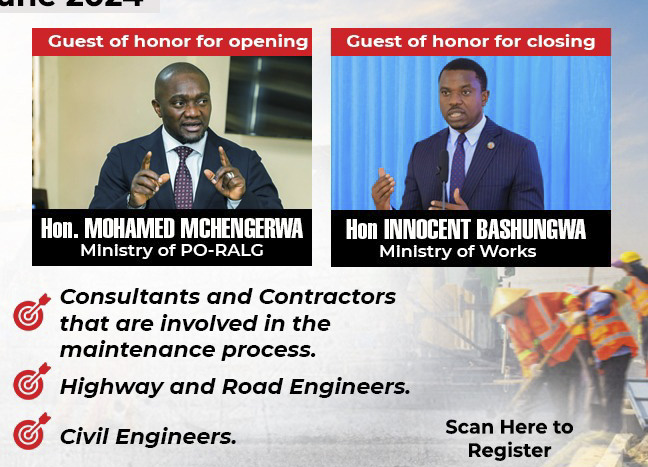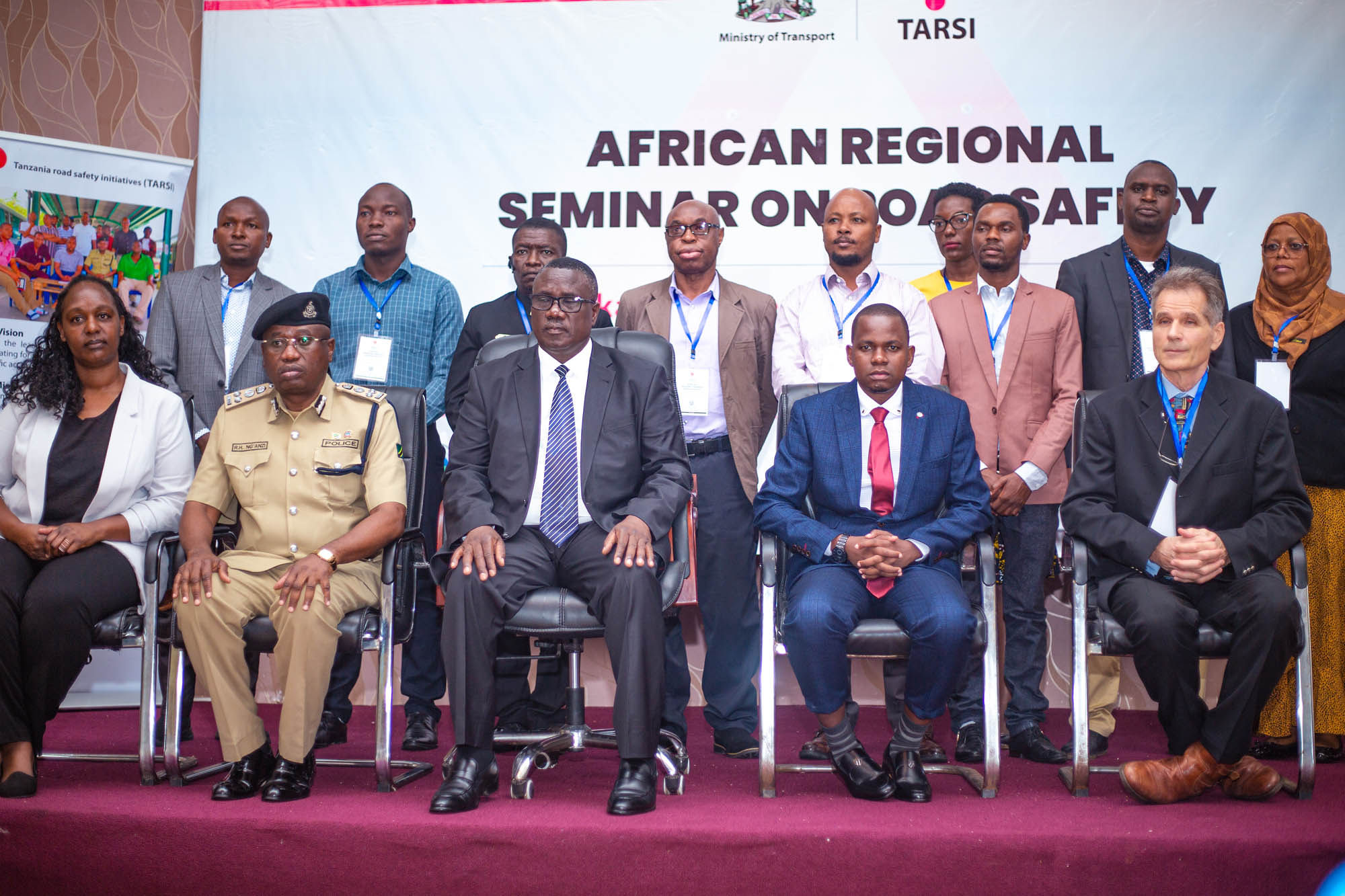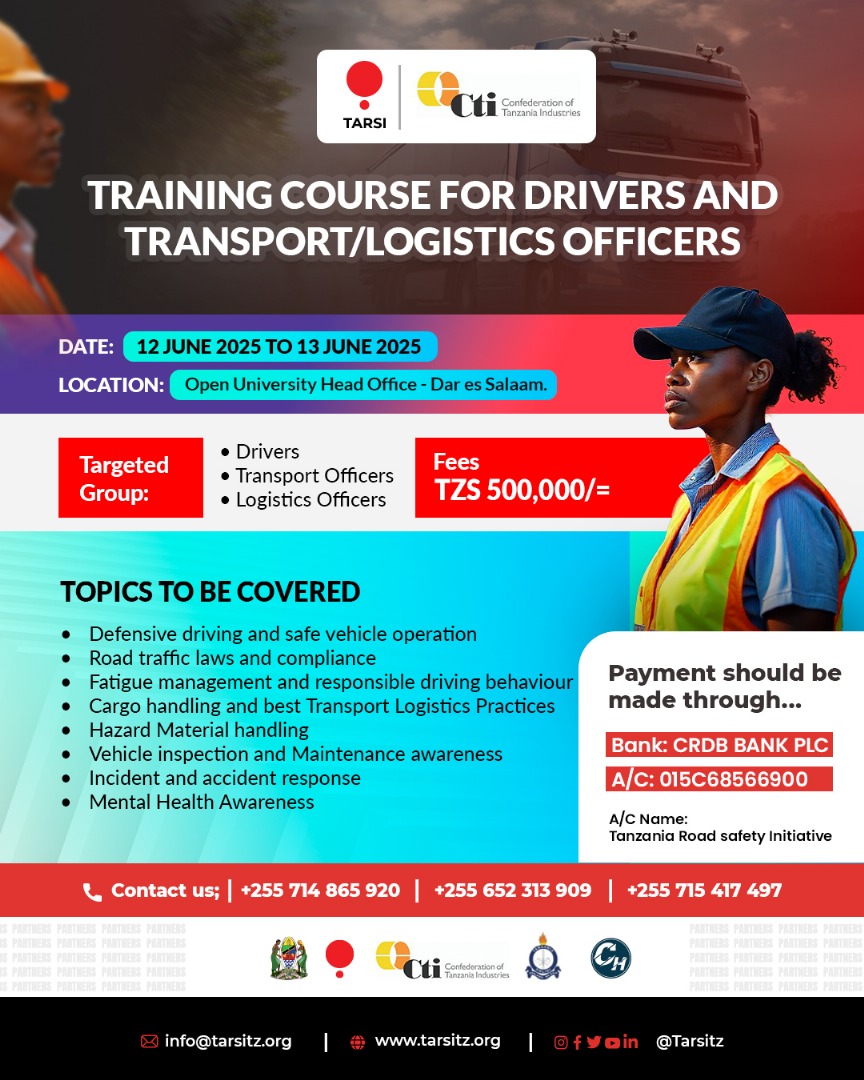Training Course on Road Infrastructure Maintenance and Management to Ensure Road Safety in Tanzania
Summary
Road Infrastructure is an asset that contributes significantly to the economic growth of Tanzania and poverty reduction. However, like many other assets, roads deteriorate with time and thus need to be maintained. Roads deteriorate due to the effect of the environment and traffic loading (As we have been observing many roads deteriorate during heavy rain seasons and the destruction of bridges or a small spot becomes a big one that causes accidents). Road maintenance requires a huge number of resources and thus imposes a major challenge to many low-income developing countries like Tanzania where there is always a competing demand for very limited resources available. Therefore, an economic evaluation of different road investment strategies becomes necessary to have scientific criteria for the most economic utilization of the few resources available. Hence the training course will help in revealing different management methods on road infrastructure maintenance and collect recommendations for improving road safety of our roads in Tanzania through comprehensive discussions with road experts/ stakeholders within and outside the Country. This road infrastructure maintenance and management course provides participants with a comprehensive understanding of road maintenance, emphasizing the need to address maintenance issues adequately to ensure better safety in Tanzanian Roads. This road maintenance and infrastructure management course is crucial to reducing the lifecycle costs of the road network and infrastructure. As the road networks have been extensively developed, the spotlight is on preserving and extending the life of the existing infrastructure. Therefore, road agencies and companies must recognize that road maintenance fundamentally differs from constructing new roads. Whereas construction projects are typically defined by a clear start and end, maintenance requires a continuous commitment. Unlike the design and construction phases, where engineering issues are paramount, maintenance is a fundamental management issue. Optimization of these processes often involves institutional reforms, capacity building, and changes to management practices, as these form the core of road maintenance philosophy.
Understanding the Importance of Road Infrastructure Maintenance & Management.
Infrastructure maintenance, including the upkeep of roads and associated infrastructure, is essential for ensuring safe and efficient transportation systems. This road maintenance and infrastructure management course delves into the importance of road infrastructure maintenance, illustrating how proactive preservation strategies can minimize overall costs and disruptions while providing a sustainable approach to managing our transportation networks. By understanding road infrastructure maintenance definitions and management systems, participants in the road maintenance and infrastructure management course are better equipped to execute rigorous maintenance infrastructure protocols and appreciate the importance of a robust county road maintenance program to the longevity and reliability of these critical assets.
Targeted Groups
- Government Agencies managing roads.
- Government Agencies that influence the development and safety of roads.
- Project Managers. Traffic Engineers.
- Civil Engineers.
- Highway and Road Engineers.
- Consultants and Contractors that are involved in the maintenance process.
- Researchers, Consultants, and Practitioners are in traffic engineering, specializing in management, analytics, optimization, project management, and traffic optimization.
- Engineers, Engineering technologists, and Project Managers engaged with Government Agencies.
Course Objectives
- By the end of this road maintenance and infrastructure management course, participants will:
- Comprehend the importance of road maintenance management.
- Plan and prioritize road maintenance employing multiple criteria decision-making.
- Develop a comprehensive road management plan.
- Identify and recommend improvements for existing maintenance programs.
- Thoroughly evaluate complex road maintenance programs and plans.
- Learn some modern tools for road maintenance.
Targeted Competencies
At the end of this road maintenance and infrastructure management course, the target competencies will be able to:
Understand the lifecycle cost of the road network.
Master the maintenance management planning and execution.
Development of robust maintenance strategies.
Expertise in maintenance prioritization.
Manage budgeting and financial aspects related to road maintenance.
Implement modern tools and technologies for road inventory management.
Promote maintenance sustainability.
Course Content
Unit 1: Road Infrastructure as an Asset
Introduction.
Define the purpose of road maintenance activities.
Manage road network inventory.
Understand strategies for the prevention of road
deterioration.
Outline road maintenance management activities.
Unit 2: Monitoring and Actions
Classification of road.
Monitoring of surface condition.
Variables in road condition monitoring.
Recognizing factors affecting road lifetime.
Learn about procedures for pavement rehabilitation
and recycling.
Unit 3: Road Maintenance Project Management
Overview of maintenance operations.
Management of road surfaces.
Shoulders and approaches.
Maintenance of roadsides.
Understand how to maintain bridges, tunnels, and drainage structures.
Understand the implementation of traffic controls and safety devices.
Control adverse weather conditions like snow, ice, dunes, and sand.
Unit 4: Road Maintenance and Construction
Determine pavement condition.
Strategies for pavement resurfacing.
Manage work zones for minimal disruption.
Structure a road maintenance program.
Learn how to set road maintenance goals and
performance measures.
Unit 5: Developing a Robust Road Maintenance Plan
Road improvement project planning.
Craft project strategies and proposals.
Deliver project outcomes.
Road survey overview.
Conduct road surveys and preliminary analysis.
Understand how to create an effective communication plan.
Address road maintenance quality issues.
Implement preventive road maintenance techniques.
Learn about promptly addressing road emergency repairs.
Plan for road rehabilitation.
Road reconstruction.
Unit 6: Leveraging Engineers’ Tools for Road Maintenance
Application of LIDAR systems.
Capture road inventory through point cloud data collection.
Employ traffic data collection and big data analytics.
Conduct road safety audits.
Incorporate road design innovations.
Integrating Intelligent Transportation System, ITS.
Lead Resource Person and other Local and International Guest Speakers
a. Lead Resource Person
There will be two lead resource person, one from Canada the other from Tanzania
b. International Speakers
There will be five other international experts of which their details will be presented in the final announcement later
c. Local Speakers
There will be five local Tanzanian Experts of which their details will be presented in the final announcement later.
Course Language
The official Language of the Training Course will be English. No translation service will be provided. However, during the opening and closing ceremonies, Kiswahili will be used.
Virtual Attendance
There will be no service or facilitation to virtual attendance, all delegates will have to attend physically at Dar es Salaam.
Accreditation and Certification of the Course
Delegates attending the
course fully will be given Certificates of Attendance which are accredited by the Engineers Registration Board of Tanzania (ERB). As for the registered engineers, their certificates will have professional development units (PDUs), the exact number of PDUs will be communicated in the final announcement.
Tour
The sixth day (Saturday, 29th June 2024) will include a non-technical tour for interested delegates to enjoy some of the region’s tourist attractions and provide further networking opportunities. The visit costs will be covered by the Organizing committee that is; transport, food, and refreshments as well as entrance fees.
Accommodation during the Course
Accommodation during the Course will be covered by an individual delegate/ their Institutions. Most Hotel prices range from USD 20 to USD 170 (Depending on the quality and distance). If any delegate has a special request, please contact the organizing committee.
Course Location
a. Dar es Salaam
Dar es Salaam is Tanzania's economic capital and the largest city which is also the economic center of East Af rica. The city is Tanzania's most important city for government and business, holding half of Tanzania's industrial employment. Dar es Salaam is Tanzania's main base for government offices as well as diplomatic missions and non-governmental organizations.
b. Four Points by Sheraton Dar es Salaam New Africa Hotel
Right in the heart of Tanzania’s biggest city, with views of Dar es Salaam Harbour and close to the Central Business District. Four Points by Sheraton Dar es Salaam New Af rica Hotel is situated near the Zanzibar ferry, the hotel is the perfect starting point for everyone who wants to explore the city and beyond. Soak in the city’s vibrant energy on the rooftop terrace or sample the flavors of the world in one of the 5 restaurants and bars, featuring everything from fresh seafood, and Thai cuisine to Indian fare.
Registration fees
Registration Fee for Course is Tshs 2,000,000/=
Mode of Payment
All Delegates are advised to pay registration fees for the Course through bank transfer to Tanzania Road Safety Initiative Bank account below before 10th June, 2024 so as to facilitate an efficient preparation of the Course;
Bank Name: CRDB Bank PLC
Account name: Tanzania Road Safety Initiative
Account number: 015C685669900
Branch: Magomeni
Swift Code: CORUTZTZ
Contacts:Tel: +255(22)2197700/ +255(0)714197700
Email: info@crdbbank.co.tz
Address: P. O. Box 90250, Dar es Salaam – Tanzania.
The registration fee will cover:
-
5 Days Training Course attendance
-
Seminar materials
-
Hotel Lunches, morning and evening tea
and refreshments during the training
-
Certificate of attendance
-
Tourism visit on the sixth day
-
Please Note:
Dinner, Accommodation, Transport to/from Dar es Salaam and daily to the training will not be covered in your registration fee as these costs will be accommodated by an individual Delegate.
How to Register for the Course
Delegates are advised to register by filling out the form bellow and attach a scanned receipt of payment. You can also contact the Secretariat through +255714865920 and +255689166379. If the Institution or Delegate would like to have an invoice before paying the fee.
Registration will be acknowledged and confirmed by email within three working days after being received.
Cancellation
Delegates who after registering are unable to attend the training course are welcome to nominate a substitute delegate. If no one can be nominated as a substitute a refund of registration fees will be made if a written request is received by 10th June, 2024. No refunds will be given after that date however; nominations for substitute delegates will continue to be accepted.
All World Bank-financed projects in Tanzania are required to achieve a minimum 3-star iRAP safety rating, announced by TANROADS yesterday at the African Regional Seminar on Road Safety in Mwanza.
Eng. George Daffa from the Tanzania Roads Agency (TANROADS) presented on the TanRAP experience implementing the iRAP Methodology to eliminate high-risk roads.
His presentation confirmed the legal requirement of road safety audits including World Bank’s minimum condition that road designs and upgrades achieve a minimum 3-star safety standard to be eligible for bank financing.
Tanzania’s Road Safety Policy requires road authorities to monitor the safety of their roads, identify locations with high crash rates and implement safety improvements.
Eng. Daffa said, “It is good to have these targets so that we can know where to aim as a starting point. All that is lacking is the adequate budget to help us realise this.”
The results of world-first Ten Step Project in Tanzania were shared at the event, along with training in the iRAP Methodology by AfricaRAP Lead Racheal Nganwa.
Racheal Nganwa said, “The World Bank 3-star or better policy is just one example of the far-reaching and lifesaving impacts of the Ten Step Tanzania Project. The Bank is now implementing the policy on all their projects and building internal capacity to be able to assess the safety of road designs. We applaud World Bank for its leadership in prioritising safety in its projects, ensuring safe journeys for road users across the country.
The African Regional Seminar on Road Safety runs from Monday 27 November to Friday 1 December, hosted by the Tanzania Road Safety Initiative (TARSI) in collaboration with government institutions and supported by the Ministry of Works and Transport, Tanzania .
The Seminar includes a comprehensive programme of presentations on Africa’s road safety challenge and latest research and initiatives for safe roads and roadsides, safe speeds, safe road use, safe vehicles and post crash response.
For more information:
- Download the Seminar agenda here
- Read more on the Ten Step Tanzania Project and outcomes
Racheal Nganwa said, “The World Bank 3-star or better policy is just one example of the far-reaching and lifesaving impacts of the Ten Step Tanzania Project. The Bank is now implementing the policy on all their projects and building internal capacity to be able to assess the safety of road designs. We applaud World Bank for its leadership in prioritising safety in its projects, ensuring safe journeys for road users across the country.
The African Regional Seminar on Road Safety runs from Monday 27 November to Friday 1 December, hosted by the Tanzania Road Safety Initiative (TARSI) in collaboration with government institutions and supported by the Ministry of Works and Transport, Tanzania .
The Seminar includes a comprehensive programme of presentations on Africa’s road safety challenge and latest research and initiatives for safe roads and roadsides, safe speeds, safe road use, safe vehicles and post crash response.
For more information:
African Regional Seminar on Road Safety
Summary
Tanzania Road Safety Initiatives (TARSI) is organizing an African Regional Seminar on Road Safety in collaboration with various government institutions and supported by the Ministry of Works and Transport, Tanzania. The seminar will take place from November 27th to December 2nd, 2023, at the Malaika Beach Resort in Mwanza, Tanzania. The seminar aims to promote road safety awareness and collaboration among stakeholders in the African region.
How to Participate:
1.Registration:
Participants can register for the seminar by filling out the provided registration form with their personal and organization details.
2. Fees:
The registration fee for Tanzanian delegates is Tshs 2,000,000/=, and for international delegates, it's USD 1,100. Additionally, there is a registration fee for exhibitors: Tshs 4,000,000/= for Tanzanian exhibitors and USD 1,800 for international exhibitors.
3. Mode of Payment:
All registration fees, including seminar and exhibition fees, should be paid through a bank transfer to the Tanzania Road Safety Initiative's bank account provided in the announcement. Payment must be made before November 6th, 2023.
Bank Name:CRDB Bank PLC
Account name: Tanzania Road Safety Initiative
Account number: 015C685669900
Branch: Magomeni
Swift Code: CORUTZTZ
4. Accommodation:
Delegates are responsible for their own accommodation costs, which range from USD 30 to USD 170, depending on the quality of the hotel. The organizing committee will provide a list of discounted hotels for delegates to choose from.
5. Seminar Language:
The official language of the seminar is English, and there will be no translation services.
6. Virtual Attendance:
Virtual attendance is not available; all delegates must attend the seminar physically in Mwanza.
7. Accreditation and Certification:
Delegates who attend the seminar will receive Certificates of Attendance accredited by the Engineers Registration Board of Tanzania. Registered engineers will also receive professional development units (PDUs).
8. Tourism Visit:
On the sixth day (December 2nd, 2023), there will be a non-technical tour to explore the region's tourist attractions, and the organizing committee will cover the visit costs, including transport, food, refreshments, and entrance fees.
Seminar Highlights:
The seminar will focus on the Safe System Approach, emphasizing collaboration between road safety stakeholders.
- It will cover five themes: Safe roads and roadsides, Safe Road Use, Safe speeds, Safe vehicles, and Post-crash response.
- Topics to be covered include psychology of road users, road safety audits, vehicle inspections, speed enforcement, and post-crash response systems.
Target Audience:
The seminar is aimed at middle management/operational level delegates from Tanzania and other African countries involved in road safety, including engineers, road designers, contractors, transport officers, traffic police, and road safety practitioners.
Important Information:
- Delegates must complete a Traveler's Health Surveillance Form within 24 hours prior to arrival.
- Visa requirements should be checked with the local Tanzanian Embassy.
- The seminar will take place at Malaika Beach Resort in Mwanza, Tanzania.
- The organizing committee can be contacted for inquiries and registration details.
Cancellation Policy:
Delegates can nominate a substitute delegate if they are unable to attend. Refunds for registration fees are available if requested in writing by November 6th, 2023.
Exhibition Opportunities:
Exhibitors can showcase products, services, and technologies related to road safety during the seminar. Exhibition booths include various facilities, and exhibitor details will be featured in the Official Guide.
For more information, participants can contact us
Updates


May 13th, 2024

Nov 29th, 2023

The Tanzania Road Safety Initiative (TARSI), along with key government bodies like the Ministry of Transport (MoT) and others, organized the African Regional Seminar on Road Safety from November 27th to December 1st, 2023. The seminar aimed to address road safety challenges in Africa through collaboration, knowledge sharing, and strategy development. The objectives included advocacy for road safety, aligning with national strategies and global goals to reduce traffic accidents. TARSI's collaborations with international stakeholders were highlighted, emphasizing the seminar's role in sharing best practices and innovative solutions.
December 1st, 2023

